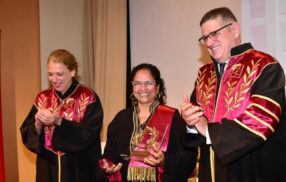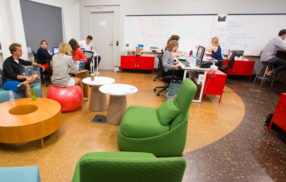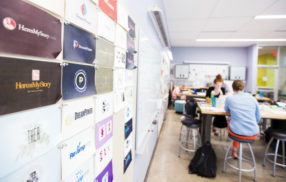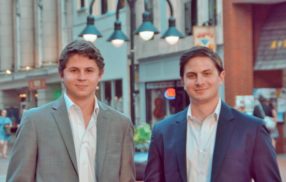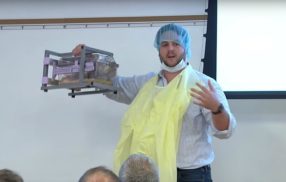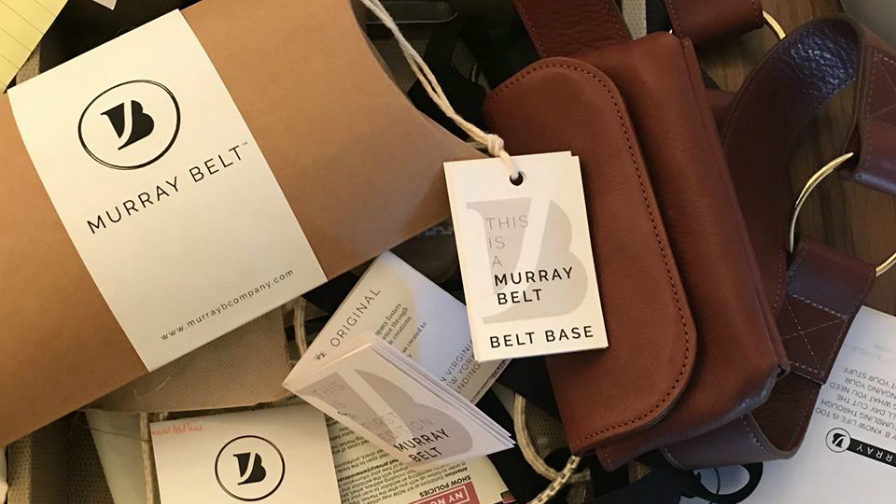
Nothing Ventured, Nothing Gained: Checking in With 2018 i.Lab Incubator Startups
By Jay Hodgkins
The 2018 i.Lab Incubator program — a 10-week summer accelerator for startups founded by members of the University of Virginia and Charlottesville communities, operated by the Darden School of Business Batten Institute for Entrepreneurship and Innovation — has reached its halfway point.
The ventures are making progress, and in some cases founders are even markedly changing strategies and business concepts for their startups based on the lessons learned and collaboration taking place during the incubator. The W.L. Lyons Brown III i.Lab at UVA is helping those outside the program keep up with the 2018 incubator cohort through a series of blogs on the i.Lab at UVA website profiling each venture. Read some of the highlights below.
Murray B. Company
For many people, handbags, backpacks, or messenger bags are the go to option for light, simple storage. The U.S. handbag market alone brought in $11.6 billion dollars in 2015, according to a report from market research company NPD Group, Inc. Margaret Murray Bloom, however, is not one of those people.
“The origin of the Murray Belt is from a real pain point of mine, which was that I never had pants that had pockets big enough to hold my phone, wallet, and keys. A purse or something similar is an inconvenience for me — I work on a farm, and can’t carry a bag with me everywhere I go. So, I wanted a way to carry my essentials and also get rid of the decision fatigue that comes with constantly managing those essentials.”
Margaret’s Murray Belt combines the stylistic qualities of a bandolier belt and the convenience of a handbag into an attractive, low form factor over-the-shoulder belt that sits tight against the torso, accompanying you from music festivals to rock climbing, from dinner parties to a late night walk.
Read more
MAP Sports
A search online for a “measurable system of motivation” will bring up research papers with dense psychology terminology and vague phrases like “a general theory of measurable systems” or “circumstances… which may help distinguish between different dimensions of motivation.” That’s something that the team behind the Mindset Assessment Project for Sports, or MAP Sports for short, is hoping to change. “What’s the recipe that optimally motivates people in general? I can’t give you a recipe or formula [for motivation] that will fit on a Post-It note. And that’s why we’re here,” co-founder Kenn Barron states decisively.
Kenn is a professor of psychology at James Madison University, where he is a co-director of the Motivation Research Institute along with Chris Hulleman, another co-founder of MAP Sports. Right now, he is collaborating with the four other members of MAP Sports to develop a simple and effective method to quantitatively measure motivation, starting with the field of sports psychology.
…
In order to address this lack of clarity about the mentalities and motivations driving both players and coaches, MAP Sports is looking to “help sports organizations identify and improve the psychological mindsets essential to high performance and well-being,” as phrased in the mission statement that is front and center on the MAP Sports website.
Read more
MIST
Every year, around three million cases of scoliosis are diagnosed each year in the United States, with the majority of these cases being idiopathic scoliosis manifesting in children between 10 and 12 years old (Johns Hopkins School of Medicine). According to the National Scoliosis Foundation, approximately 38,000 surgeries for scoliosis are administered every year. A specific kind of scoliosis named adolescent idiopathic scoliosis, or AIS, is “a fancy term for an extreme curvature of the spine in children that has no known source,” says Alexander Singh, CEO of Minimally Invasive Spinal Technology, LLC.
Minimally Invasive Spinal Technology, LLC, or MIST for short, is aiming to significantly improve treatment for scoliosis patients, specifically children afflicted with AIS. Alexander first became familiar with the complex and tedious AIS surgery procedure when a family member of his was diagnosed with scoliosis. “Last summer, my younger brother had surgery for AIS, and after he had that surgery, I reviewed his experiences and thought to myself, ‘There’s definitely a better way to do this — a way to not create as much pain, and to make the lives of patients a lot easier.’”
Read more
The i.Lab will continue to profile additional incubator ventures throughout the summer on its news webpage.
The University of Virginia Darden School of Business prepares responsible global leaders through unparalleled transformational learning experiences. Darden’s graduate degree programs (MBA, MSBA and Ph.D.) and Executive Education & Lifelong Learning programs offered by the Darden School Foundation set the stage for a lifetime of career advancement and impact. Darden’s top-ranked faculty, renowned for teaching excellence, inspires and shapes modern business leadership worldwide through research, thought leadership and business publishing. Darden has Grounds in Charlottesville, Virginia, and the Washington, D.C., area and a global community that includes 18,000 alumni in 90 countries. Darden was established in 1955 at the University of Virginia, a top public university founded by Thomas Jefferson in 1819 in Charlottesville, Virginia.
Press Contact
Molly Mitchell
Associate Director of Content Marketing and Social Media
Darden School of Business
University of Virginia
MitchellM@darden.virginia.edu



